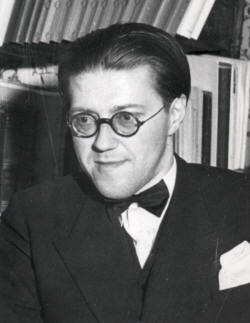Partner
Jan-Magnus Bruheim
Queer Places:
Lom District Museum, Fv55 124, 2686 Lom, Norway
Lom Kirkegård
Lom, Lom kommune, Oppland fylke, Norway
 Tor
Jonsson (May 14, 1916 - January 14, 1951) was a Norwegian poet. Jonsson grew
up in a poor family in a small rural community in eastern Norway, and was very
attached to his mother. After his mother's death, in June 1950, he moved to
Oslo, where he committed suicide on New Year's Day, six months later.
Tor
Jonsson (May 14, 1916 - January 14, 1951) was a Norwegian poet. Jonsson grew
up in a poor family in a small rural community in eastern Norway, and was very
attached to his mother. After his mother's death, in June 1950, he moved to
Oslo, where he committed suicide on New Year's Day, six months later.
Jonsson's parents were the farmer Johannes Jonsson and his wife Tøro Torsdotter Erlandsstugu. Tor
Jonsson's father ran as a tenant the farm Kroken near Lom in Gudbrandsdal and was active in local politics with the Arbeiderdemokratene and later in the Radikale Folkeparti. When the Kroken family had to leave in 1924, Johannes
Jonsson built a small log cabin with the help of friends. He did not have his own land for cultivation, so he had to earn his living as a wage-earning agricultural worker.
When Tor Jonsson was 13 years old, his father died of a heart attack. The
family lived in poor conditions.
His poems reveal a split personality. The poet admits that he is a man no
one knows, because there is another living inside him, a man who never owned
his proper words. Many of his poems express solitude and longing after
someone, a friend to be near, maybe in an Arcadia, since only there does love
grow: ‘Never, never to speak out / about what you bear in your heart, / … / to
live on lies in a crowd of people’ (from ‘Bunden til bålet’, ‘Bound to the
fire’).
Jonsson had at least one close friend, the poet
Jan-Magnus Bruheim. They
planned to build a cabin together in the mountains, a cabin Bruheim had to
build alone. He called it Torbu (‘ Tor's cottage’) after his friend. Bruheim's
poem ‘Venetape’ (‘ Friend's loss’) is a love poem written after the death of
Tor Jonsson: ‘I'm standing here in front closed, calling on you / from the
solitary shore by the quiet lake / The cries break out of depth: Come back. /
But friendship wakes no one up from death.’
Many of the themes and motifs in the poetry of Jonsson and Bruheim are
closely related to the Whitman tradition, and to the works of another
Norwegian poet, Åsmund Sveen.
Already in his first collection of poems, Andletet (The Face, 1932), Sveen is
much more explicit about his gay feelings: ‘Now I know / I'm not like the
others. / I'm different’. Several of Sveen's poems from the inter-war years
have a homoerotic content, but his reputation as a poet has been overshadowed
by the fact that he was a member of the Norwegian Nazi party during World War
II. Of these three poets, Sveen is the only one who is officially known as
gay.
Jonsson was not happy in Oslo, although he was now a successful writer and
no longer had any financial worries. He was lonely and depressed, succumbed to
alcohol and took pills. On January 10, 1951, he attempted suicide, as a result
of which he died in hospital four days later. He was buried in his hometown of
Lom. His parents' house is now part of the local history museum of the
municipality of Lom. The Lom Rural Museum is located at Presthaugen, a lovely and peaceful nature site behind the Norwegian Mountain Museum and within walking distance of Lom Stave Church. The Rural Museum consists of 23 buildings, giving a living example of the architecture and building methods on a large farm, with insight into the life of a seter (mountain dairy) farmer.
My published books:


BACK TO HOME PAGE

- Tor Jonsson -
Wikipedia, the free encyclopedia
- Robert Aldrich and Garry Wotherspoon. Who's Who in Gay and Lesbian
History Vol.1: From Antiquity to the Mid-Twentieth Century: From Antiquity
to the Mid-twentieth Century Vol 1 (p.243). Taylor and Francis. Edizione
del Kindle.
 Tor
Jonsson (May 14, 1916 - January 14, 1951) was a Norwegian poet. Jonsson grew
up in a poor family in a small rural community in eastern Norway, and was very
attached to his mother. After his mother's death, in June 1950, he moved to
Oslo, where he committed suicide on New Year's Day, six months later.
Tor
Jonsson (May 14, 1916 - January 14, 1951) was a Norwegian poet. Jonsson grew
up in a poor family in a small rural community in eastern Norway, and was very
attached to his mother. After his mother's death, in June 1950, he moved to
Oslo, where he committed suicide on New Year's Day, six months later.
